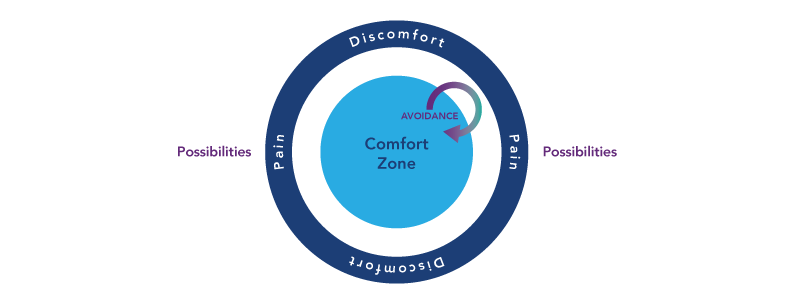Welcome
Unleash your future well-being:
Harnessing the Strength of Discomfort as Your Ally
My dear Friends,
I hope you are well and enjoying the warm spring or autumn sunshine rather than fretting over the global doom and gloom news cycles.
I wanted to take a moment to share something: embracing the power of discomfort can truly be a game-changer. Throughout my own life‘s journey, I’ve learned that staying within my comfort zone only kept me stagnant, anxious and overwhelmed.
The more confusing things are in the world around us, the more motivated we should be to change and never to return.
Let´s delve into the concept of embracing discomfort and making it our ally. We will explore why avoiding discomfort can stagnate our progress and limit our potential. We’ll discover the hidden opportunities that lie within the discomfort zone and how they can ignite personal and professional growth.
So, if you’re ready to embark on a journey to greatness, buckle up and get ready to embrace the power of discomfort.
The easy path
We just love our comfort zone because it’s easy and feels secure. It’s a cushy bubble where we can avoid risks, challenges, and any potential discomfort.
We’ve become addicted to the comfort of familiarity and predictability. Stepping outside of that zone means facing the unknown, and that’s downright terrifying. We’d rather cling to the monotony of our routines, even if they’re unrewarding. Taking a leap into the uncertainty of growth really scares us.
We are wired to believe that staying in our comfort zone is a safe choice. However, our intellect knows it’s just an excuse to avoid hard work and potential failures. After all, we’re creatures of habit, and breaking free from that comfort is daunting.
“If it scares you, it might be a good thing to try.”
Seth Godin, Us Author and Entrepreneur; born 1960
An ever-changing world
The ever-accelerating whirlwind of technology, businesses, and policies is throwing us all in a loop! It’s like we’re on a never-ending roller coaster of confusion and disarray. We’re stuck in an awkward limbo: teetering between discomfort, anxiety, and “What the heck is going on?!”
Including myself! I’m right there in the chaos, just like everybody else. I try to stay ahead of the curve and prepare for whatever curveballs life throws at me. Believe me, it is no walk in the park!
Yet, if we want to thrive in this madness, we’ve got to embrace the art of getting comfortable with being uncomfortable.
Cognitive dissonance
Picture this: inside our brains, we have these nifty maps of our comfort zones. They’re like little cosy spots where we feel all warm and fuzzy. However, when the world around us goes haywire, those comfort zones start to clash with reality. It’s like a battle of beliefs versus facts; let me tell you, it can feel pretty darn disorienting.
As a result, we’re caught in a whirlwind of cognitive dissonance. Our brains are in “Wait a minute, this doesn’t add up!” mode. So, whether you’re questioning your own sanity or just trying to make sense of it all, remember, it’s all part of the wild ride we call life.

Personal “uncomfortable meter”
We all have our own personal “uncomfortable meter” that determines how much we can handle. Some of us have a super high threshold and can handle all sorts of discomfort. Others prefer to stay cosy and avoid any kind of discomfort like the plague.
But the fact is we need to embrace the inconsistencies and ride the waves of uncertainty. Why? Because if we don´t, we endanger our well-being.
There are ways to make stepping outside your comfort zone a little less terrifying. It is about finding suitable baby steps that gently expand your comfort zone without causing a full-blown panic attack.
Be it the thrill-seeker or the comfort craver, we all need to explore the world beyond our comfort zones. If only to secure our future well-being.
People who are more comfortable being uncomfortable have chosen to stretch their limits constantly. They are already in the habit of pushing themselves to their limits. As a result, they know what being outside their comfort zone is like.
Additionally, these same individuals have developed an increased tolerance for discomfort as a result of becoming desensitized over time. They built their strength by constantly facing new difficult situations and learning from them.
Yet, the comfort craver has to take one small step at a time! As for her, it can be hard to feel comfortable experiencing new situations. It will, however, become easier with growing experience and learning from mistakes. As an added benefit, the comfort- craver might just discover a new and improved comfort zone!
Resistance is Pointless
The fact is we’re programmed to dodge discomfort. We steer clear of those intense thoughts and emotions that clash with our own beliefs. Our brain’s natural instinct to alleviate unease traps us in our cosy bubbles.
The result: procrastination, excuses, denial, avoidance and justification, and ultimately, immobilization and inaction.
However, this does not serve our future well-being. On the contrary! Feeling paralyzed stops our growth, blocks opportunities, and hinders mindset, behaviour, and action development. To thrive in the future, we must find flow and motivation amidst instability and uncertainty in our “next normal”.
Being uncomfortable vs. being scared
Feeling scared and being uncomfortable are utterly different feelings. Being uncomfortable is like finding yourself in a weird, unfamiliar, and unpredictable situation that’s totally out of the ordinary. On the other hand, feeling scared involves experiencing fear or anxiety about something bad happening to you or the people around you.
We can feel uncomfortable without necessarily feeling scared. Furthermore, it is impossible for individuals to avoid discomfort since it is essential to life. Initially, when faced with something unfamiliar or different, most people feel uneasy. Nevertheless, they usually adapt to the situation as they become more familiar with it.
The key is knowledge and practice. It’s important to get familiar with new situations. However, feeling scared or anxious in new situations might indicate a deeper problem requiring more attention.
Discomfort is your ally
Just imagine the infinite possibilities that could happen if you developed the courage to step out of your comfort zone. Our natural instinct is to avoid discomfort. The brain is wired to seek pleasure and avoid pain. But great success comes from stepping out of your comfort zone.
The sensation of making progress, achieving goals, and overcoming challenges in life is all tied to feeling uncomfortable. However, when you step out of your comfort zone, you build mental resilience. Consequently, you have no choice but to explore new approaches, systems, or routines that can assist you in pushing forward. As a result, you experience growth.
Making of an ally
No need to give up on the “feel uncomfortable to feel comfortable ” project yet. Embracing our curiosity and having the courage to pursue will help counteract fear.
Usually, it’s healthy to have a comfort zone in our everyday lives. However, being brave and taking risks when faced with challenges and tough situations can make us more flexible and adaptable. It enables us to improve our ability to transition and transform.
Once we muster the courage to take small steps outside our comfort zone, something remarkable happens – we will feel encouraged to take the next step and the next, and the next… We keep confronting our fear zones, inching closer to facing our fears of loss, blame, shame, envy, punishment, opposition, control, and humiliation.
First steps
However, while pushing outside your comfort zone is important, it might be best to back off for a while if you feel extremely uncomfortable or fearful.
Most importantly, always remember you are not the only one– plenty of other people are also outside their comfort zone. They might feel as uncomfortable as you do!
Picks
We just love our comfort zone because it’s easy and feels secure.
We all have our own personal “uncomfortable meter” that determines how much we can handle.
We avoid intense thoughts and emotions that clash with our beliefs.
However, this does not serve our future well-being. Feeling paralyzed stops our growth, blocks opportunities, and hinders mindset, behaviour, and action development.
We can feel uncomfortable without necessarily feeling scared.
The sensation of making progress, achieving goals, and overcoming challenges in life is all tied to feeling uncomfortable.
Once we muster the courage to take small steps outside our comfort zone, something remarkable happens – we will feel encouraged to take the next step and the next, and the next….
SOURCE: VERY WELL MIND; BEHAVIOURAL SCIENTIST; BETTER UP; FORBES; PSYCHOLOGY TODAY






